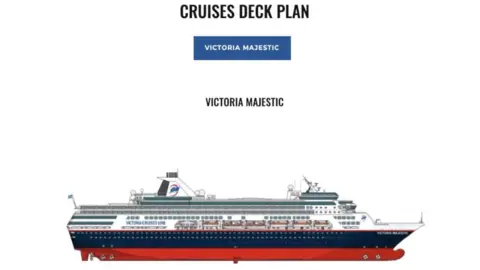Business
The around-the-world cruise that is yet to set sail

Suranjana TewariAsia Business Correspondent
 BBC
BBC“Throw your current lifestyle overboard!” boasts the advert for Victoria Cruises Line (VCL), which bills itself as the world’s first affordable residential cruise.
Cabins typically go for US$3,840 (£2,858) a month for a three-year voyage to 115 countries, and travellers from all over the world have the option of doing the route for as long as they like.
For Australians Dennis and Taryna Wawn from Perth, excited by the prospect of a home at sea, the advert on Facebook couldn’t have come at a better time as they planned their retirement.
Three years later, the ship has yet to sail. In fact, they and other would-be cruise residents have found that VCL does not even own or have a lease on the ship that is being advertised.
The Wawns are just two of dozens of people who have been waiting for VCL to refund their deposits, the BBC has learned.
Other would-be residents told the BBC they sold their homes, rehomed cats and put their belongings into storage. One woman said she had put down her sick dog, believing she would be gone for years.
Another couple have now had to move into a retirement community because of their advanced ages and failing health. They could no longer commit to a residential cruise that might or might not ever sail.
“The people that put down a deposit for this cruise were sold a dream… and it has turned into nothing short of a nightmare,” said Adam Glezer, who runs a consumer advocacy company. “What VCL has done is disgusting.”
Those affected have contacted the company, some have launched legal cases and others have filed consumer complaints to government agencies. One even wrote to the FBI.
VCL told the BBC that it still needs more customers before a vessel can be chartered and so is continuing to advertise the cruise.
The company said customers knew about the occupancy condition when booking, and the company denies targeting or harming anyone, adding that it advised some clients not to sell homes to pay deposits.
Many of those who signed up have given up hope of the ship ever sailing, or of getting their money back.
‘All above board’

Taryna, 64, said that in May 2022, she and Dennis were starting to think about their future and what it could look like when they came across the residential cruise. The couple feel they did their due diligence.
Taryna said the company had a well-built and detailed website, they also spoke to a man from the company “who answered all the questions”, and they joined a Facebook group made up of other cruise “residents”.
“We did some checking, thought it was all above board,” she said.
Within a month, they took the step of paying a deposit of US$10,000 (£7,450). Their bank transfer has been viewed by the BBC.
But weeks before they were due to set sail in May 2023, VCL postponed the scheduled departure date.
In an email viewed by the BBC, VCL said the cruise hadn’t reached a roughly 80% occupancy – something the company said it needed in order to charter a vessel.
When VCL postponed twice more, the couple started to think something was up.
Then a fellow would-be resident got in touch, saying: “I’ve dug a little bit further. Get out.”
‘Our shared dream is very much alive’

VCL’s marketing promised a fully-fledged cruise liner that could house 1,350 guests, with pools, tennis courts and an Italian restaurant.
“We do have a beautiful, seaworthy ship, the former Holland American Veendam, now the Majestic,” VCL’s US representative wrote on the company’s Facebook page.
But the BBC has learned that on being contacted by some would-be residents, the firm that owns the ship denied any association with VCL.
Although it has not yet leased a ship, the company said it has continued to advertise the cruise and collect deposits in order to reach the necessary occupancy rate.
“If we had signed the lease agreement at the beginning of 2024, we would have had to pay approximately USD 18 million for nothing,” VCL said in an email to the BBC.
It also acknowledged that there had been 132 cancellations, and said it investigated 38 complaints, but found none justified a refund.
VCL also denied there were any “victims”, and said that 38 customers who asked for refunds cannot accept they were not entitled to one.
The company added that the refunds were withheld for administrative reasons, missing or incorrect bank details, failure to return termination administration agreements within deadlines, and anti-money laundering checks.
VCL’s cruise was last scheduled to depart on 26 July 2025, according to its website. But once again it failed to set sail.
“Despite the delay, we’ve been encouraged by a surprising influx of new interest in recent weeks – a strong signal that our shared dream is very much alive,” VCL’s website reads.
‘It got dirty’
Graham Whittaker, a former journalist based in Australia, estimates that VCL has taken money that goes into the millions.
“It got dirty because we started to find scores and scores more people who had never been refunded, who had asked for their money back, who had been lied to,” Whittaker said.
When passengers pushed harder – asking about refunds, and talking to the media about the case – they were threatened with legal action. The BBC has seen dozens of such emails.
“The threats and the harassments are getting serious for some,” Whittaker said.
VCL justified the threat of legal action in its email to the BBC.
“Yes, we will take legal action against anyone who tries to settle their complaint on social media,” it said.
The paper trail
Company records reviewed by the BBC show a web of shell businesses registered to the same address in Budapest, some now no longer trading.
The company is also registered in Florence, Italy, but as a specialised wholesaler of food, beverages and tobacco.
In Hungary, Viktória Takács-Ollram is listed as the founder, while her 79-year-old mother is registered as the chief executive.
Another company is registered under the same address to Viktória’s son, Marcell Herold, who is named as the vice president of VCL on its website.
In Hungary, VCL was registered in 2017 under a different name as an accounting and tax advising firm.
That changed to VCL in 2022, with “services auxiliary to waterborne transport” and “rental of water transport equipment” added.
In 2023 new activities were added: “car rental”, “lending of other machinery and equipment”.
As of 1 January 2025, its main activity is listed as “passenger transport by sea”.
Tax filings indicate more than $253,000 in unpaid taxes.
Taking matters into their own hands
A couple won a case in Hungary, overturning VCL’s contract changes, but enforcement stalled when VCL shifted its base to Italy.
VCL admitted to the BBC that it changed contracts after customers signed, and that new terms would apply retroactively.
“When drafting a contract, lawyers try to include everything. But sometimes life happens and the contract needs to be amended. That is what happened in this case,” VCL said.
“These contracts work this way for all shipping companies.”

Another couple filed a complaint in the US state of Utah, with the investigation finding that a berth was not booked on a stated departure date.
It also found that people purporting to be hired staff on the website did not plan to be on the cruise, nor had they received offers of employment.
The investigation ruling said that VCL’s US representative encouraged people to sign up for the cruise.
The investigation found that she truthfully believed the residential cruise was going to sail, but she agreed to sign a compliance order barring her from promoting such travel services in the future.
‘Not a phantom company’
Despite all of this, VCL continues to advertise its cruise on Facebook and Instagram.
Accounts on the platforms show glossy brochures of the ship’s decks, menus and cabins.

New “residents” are shown posing on board – many of them are actually stock images widely available on the internet.
To encourage lengthy stays, the cruise company has been offering hefty discounts, flash sales and cashback schemes.
Alleged victims say they have reported the ads repeatedly, but Meta – which owns Facebook and Instagram – has declined to take them down.
“It is reprehensible that these platforms are allowing advertising for VCL despite the significant amount of evidence. They should be held accountable for this,” said consumer champion Adam Glezer.
In a statement, Meta told the BBC that its advertising standards strictly prohibit deceptive or misleading ads, including scams, but it found no evidence that the page violates its policies.
VCL denied that it was running a scam, saying those affected were unable to accept that they were not entitled to a refund.
“Our company has never disappeared, we have responded to every email, so we are not a phantom company.”
Taryna said the idea of the cruise isn’t too good to be true – some people who signed up for the VCL cruise were currently travelling the world with other cruise liners.
However, for her and Dennis, going on another such cruise is no longer something they can afford.
“It was a dream for us and we were really focusing on it as a lovely adventure. It’s been traumatising.”
Additional reporting by Orsolya Polyacsko
Business
Mining companies hold FTSE back in quiet end to the week

Stocks in London ended little changed on Friday, with blue chips edging lower after notching another record as investors held fire ahead of the long weekend in the US.
“Investors have been kept on their toes year-to-date with non-stop geopolitical issues, and mixed messages from the business world. A quieter day on the corporate reporting calendar gave investors a chance to catch their breath and take stock of events,” said Dan Coatsworth, head of markets at AJ Bell.
The FTSE 100 index closed down just 3.65 points at 10,235.29. It had earlier hit a new intra-day best level of 10,257.75.
The FTSE 250 ended up 31.39 points, 0.1%, at 23,311.37, and the AIM All-Share closed just 0.27 of a point higher at 804.75.
For the week, the FTSE 100 rose 1.1%, the FTSE 250 climbed 1.2%, and the AIM All-Share advanced 2.1%.
In European equities on Friday, the CAC 40 in Paris closed down 0.7%, while the DAX 40 in Frankfurt ended 0.2% lower.
“There was a slightly negative tone across European stock indices on Friday,” commented David Morrison, senior market analyst, at Trade Nation. “It appeared that investors were more comfortable taking some risk off the table, no doubt mindful that US markets will be closed on Monday for Martin Luther King Day.”
In London, the FTSE 100 was pegged back by weak mining stocks, a key factor behind recent index strength.
The price of copper fell 3.0%, and silver slumped 3.7%, giving up some recent gains, while gold nursed less severe falls.
Gold was quoted at 4,594.24 dollars an ounce on Friday, down from 4,616.76 on Thursday.
In response, Endeavour Mining fell 2.7%, Anglo American declined 2.4%, Antofagasta dipped 2.9%, and Glencore fell 2.5%.
Strategists at Bank of America downgraded the mining sector to ‘underweight’ and lifted energy to ‘market weight’.
“After sharp outperformance for mining, the potential downside risks stemming from the sector’s macro drivers are becoming hard to ignore,” BofA said.
BofA noted that a historical divergence in commodity prices has led to a decoupling among European resources with a surge in metal prices over recent months, including a 50% rally in copper, alongside a “roll-over” in energy prices, with the oil price down 30% to four-year lows recently.
As a result, the copper-to-oil ratio has risen close to a 40-year high, which in turn has led to significant divergence between European resources sectors, with mining outperforming by 40% since April, while energy has underperformed by nearly 15%.
“Resources sector pricing looks stretched in both directions,” BofA added.
Brent oil traded higher at 64.48 dollars a barrel on Friday, up from 63.55 late on Thursday.
Pearson ended a miserable week for investors, with a further 4.1% decline.
The educational publisher has seen its shares fall 12% this week after a poorly received trading update.
A previously undisclosed contract loss for US student assessment in New Jersey, which will drag on first-half growth, was blamed for the stock fall, although analysts note Pearson is confident that the loss of the contract will have no bearing on other renewals in the coming years.
Heading higher were property companies British Land and Land Securities, up 1.4% and 1.3% respectively, on hopes lower interest rates will spark a sector upturn, while BAE Systems, up 2.3%, remained in favour amid geopolitical jitters.
Stocks in New York were little changed. The Dow Jones Industrial Average was slightly lower, while the S&P 500 index was up 0.1%, as was the Nasdaq Composite.
Economic data showed that US industrial production rose faster than expected in December.
The Federal Reserve said that on a monthly basis, industrial production increased by 0.4% in December, the same pace as in November, which was revised up from 0.2%. It was better than the FXStreet-cited consensus of a 0.1% uptick.
On an annual basis, total industrial production was 2.0% higher in December than a year prior.
Shannon Glein, analyst at Wells Fargo, said the underlying details show a “key theme from last year – everything high-tech and AI related outperformed”.
“We expect this trend to persist going forward, but it’s also worth noting that the slow yet steady ascent in all other industrial production on a year-ago basis is a sign that broader activity may be starting to recover,” she added.
The pound was quoted lower at 1.3382 dollars at the time of the London equities close on Friday, compared to 1.3388 on Thursday.
The euro stood at 1.1596 dollars, lower against 1.1607.
The yield on the US 10-year Treasury was quoted at 4.21%, widening from 4.16%. The yield on the US 30-year Treasury was quoted at 4.82%, stretched from 4.78%.
Back in London, Genus led the FTSE 250 risers, advancing 7.8%, after reporting that adjusted pretax profit for the six months to December 31 would be about £50 million, ahead of expectations.
Berenberg pointed out it was “the second guidance raise in the past three months, making it one of the standout performers within our coverage”.
“Importantly, the upgrades are being driven by strong trading in the PIC (pigs) business, which reflects the benefits of the group’s shift towards a royalty-driven model. This is increasing the defensiveness and predictability of earnings and sets a very positive tone for a year that we believe has more positive catalysts to come”, the bank added.
The biggest risers on the FTSE 100 were BAE Systems, up 47.0 pence at 2,088.0p, NatWest, up 13.8p at 652.8p, Smiths Group, up 50.0p at 2,612.0p, Schroders, up 8.6p at 467.0p and National Grid, up 20.5p at 1,201.5p.
The biggest fallers on the FTSE 100 were Pearson, down 39.6p at 939.0p, Entain, down 23.8p at 703.0p, Antofagasta, down 105.0p at 3,560.0p, Endeavour Mining, down 110.0p at 3,996.0p and Glencore, down 12.4p at 478.6p.
Monday’s global economic calendar features a slew of data from China, including GDP, retail sales, and industrial production.
In Canada, inflation figures will be published, while US financial markets are closed for Martin Luther King Jr Day.
Monday’s UK corporate calendar has a trading statement from building materials firm Marshalls.
Later in the week, trading statements are due from luxury goods retailer Burberry, sports retailer JD Sports Fashion and miner Rio Tinto.
Contributed by Alliance News.
Business
Zipcar to end UK operations affecting 650,000 drivers

Car-sharing firm Zipcar has confirmed it is stopping operations in the UK after launching a consultation late last year.
The move will hit the company’s roughly 650,000 drivers across the country.
On December 1, the US-based company told customers in the UK that it planned to suspend new bookings temporarily at the turn of the year.
The business, which had 71 UK employees at the end of 2024, launched a formal consultation with staff as a result.
On Friday, in a fresh email to customers, the business said it “can now confirm that Zipcar will cease operating in the UK”.
The company added: “In accordance with clause 7.5 of the member terms, please take this as your written notice that we will formally close your account in 30 days’ time.
“It’s not possible to make any new bookings with Zipcar UK at this time, but your account will remain open until February 16.”
It added that customers will be entitled to a pro-rated refund for any remaining periods on current plans or subscriptions, from the start of 2026.
Zipcar said this will be done automatically and will not require any action from users.
Accounts showed that the van and car hire firm saw losses deepen to £5.7 million in 2024 after a decrease in customer trips.
Business
Budget 2026: Will Markets Be Open On February 1? Full Details Inside

New Delhi: Good news for investors and market watchers! Even though February 1 falls on a Sunday this year, the Indian stock markets will remain open for trading on Budget Day. Both the BSE and NSE announced on January 16 that trading will take place as per normal market hours on February 1 for Budget 2026. This special arrangement ensures that investors can react to Budget announcements in real time, without waiting for the next trading session.
The NSE clarified the special trading arrangement in a circular, stating, “On account of the presentation of the Union Budget, members are requested to note that Exchange shall be conducting live trading session on February 01, 2026, as per the standard market timings (9:15 am-3:30 pm),” said NSE in a circular.
Union Budget 2026 to be presented on February 1 at 11 am
The Union Budget for 2026 will be presented at 11 am on Sunday, February 1, the Lok Sabha Speaker confirmed on January 12. In recent years, February 1 has become the fixed date for the annual Budget presentation, a trend that continued with the 2025 Budget as well. The upcoming Budget will also be a significant milestone for Finance Minister Nirmala Sitharaman, as it will be her ninth consecutive Union Budget, placing her among finance ministers with the longest uninterrupted Budget tenures.
Trading details for Budget Day explained
While most core market segments will remain open during regular trading hours on Budget Day, some services will stay shut. The BSE has clarified that the T+0 settlement session and the auction session meant for settlement defaults will not be operational. At the same time, the NSE confirmed that trading in capital markets and derivatives will continue as usual.
Stock market holiday list remains the same
The stock market holiday calendar for 2026 remains unchanged, with Indian exchanges observing 16 public holidays apart from weekends. The next scheduled market closure this month will be on January 26. In the first half of the year, markets will remain shut on key occasions such as Holi (March 3), Ram Navami (March 26), Mahavir Jayanti (March 31) and Good Friday (April 3). Trading will also be suspended on Ambedkar Jayanti (April 14), Maharashtra Day (May 1) and Bakri Id (May 28).
In the second half of the year, markets will close on Muharram (June 26), Ganesh Chaturthi (September 14), Gandhi Jayanti (October 2), Dussehra (October 20), Diwali Balipratipada (November 10) and Guru Nanak Jayanti (November 24). Christmas, on December 25, will be the final market holiday of 2026.
-

 Politics1 week ago
Politics1 week agoUK says provided assistance in US-led tanker seizure
-

 Entertainment1 week ago
Entertainment1 week agoWhy did Nick Reiner’s lawyer Alan Jackson withdraw from case?
-

 Sports6 days ago
Sports6 days agoClock is ticking for Frank at Spurs, with dwindling evidence he deserves extra time
-

 Tech4 days ago
Tech4 days agoNew Proposed Legislation Would Let Self-Driving Cars Operate in New York State
-

 Business1 week ago
Business1 week agoTrump moves to ban home purchases by institutional investors
-

 Sports1 week ago
Sports1 week agoPGA of America CEO steps down after one year to take care of mother and mother-in-law
-
Sports7 days ago
Commanders go young, promote David Blough to be offensive coordinator
-

 Fashion6 days ago
Fashion6 days agoSouth India cotton yarn gains but market unease over US tariff fears







